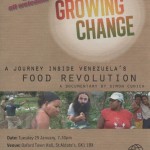 If the world produces enough food to feed everybody, how come hundreds of millions of people don’t get enough to eat? Last night’s film screening made it clear that the problem is with food distribution rather than production.
If the world produces enough food to feed everybody, how come hundreds of millions of people don’t get enough to eat? Last night’s film screening made it clear that the problem is with food distribution rather than production.
Growing Change is a documentary about Venezuela’s food revolution with an inspiring message. Despite the rainy January weather, nearly 70 people came to the screening, which was organised by Oxford World Development Movement (WDM).
We learnt that Venezuela used to be a victim of its own success; after tapping into enormous oil wealth, it was no longer worth it economically for the country to grow its own food. Instead, it began heavy reliance on imports, an all-too-common phenomenon apparently known as the “Dutch disease”. It happens when countries see food supply in purely economic terms. But reliance on imports makes a country vulnerable to global food shocks.
Global free-market economics isn’t good for small producers either. Cocoa producers told stories of buyers holding off until supplies were piled up and money was low. Then the buyers could turn up and use their stronger position to negotiate a lower price. In the fishing industry, local fishermen couldn’t hope to compete with industrial fishing vessels. When you realise that these industrial trawlers were only using 6% of their catch and throwing the rest back into the water as waste, you start to see that the corporate model isn’t the best way to manage natural resources either.
Then everything changed. A social movement, driven by communities and the government, pushed Venezuela towards “food sovereignty”. That means that control of food supply and distribution is in the hands of the people who grow and eat the food, rather than large corporations.
How? Land reform laws allowed unused land to be claimed and used for agriculture; fishing laws banned the wasteful industrial trawlers so that local fishermen could thrive again; the government changed rules on providing credit to farmers; new state-led systems of food purchasing meant farmers get a fair price for their products. This all happened in tandem with increased unionisation of farming and fishing workers and a move towards more organic, sustainable methods of farming.
Did it work? Well, malnutrition in Venezuela fell from 21% to 6% in a decade. The country has also become completely self-sufficient in the key crops of maize and rice. Workers now get a fairer price for what they grow. And Venezuela still has lots of oil money; it’s just that now they’re spending it on things like improved, accessible healthcare rather than on unnecessarily imported food.
The situation in Venezuela isn’t perfect, but it provides an interesting model for how to think differently about your country’s food supply.
After the film, there was a lively but respectful discussion about how the lessons of Venezuela can be applied here in the UK, specifically here in Oxfordshire. The audience included people from Abundance Oxford, The People’s Supermarket, East Oxford Farmers’ Market, Barracks Lane Community Garden, OxGrow, Cultivate and more. We agreed that we face different issues here, including a “lack of urgency” about food supply and a lack of political will at government level. But there were inspiring stories, including food being grown on a former tennis court! Many are also part of Food Sovereignty Now. This is a UK network of the global food sovereignty movement that includes growers, retailers and suppliers, calling for a food system that respects people and the planet. Nobody was waiting for a helping hand from government, but there was general agreement that we should keep campaigning for change at global, EU and Westminster level. In the meantime, these exciting local projects will continue ploughing their own furrow – and they deserve much more media attention.
Kate Griffin, Oxford WDM campaigner

Leave a Reply